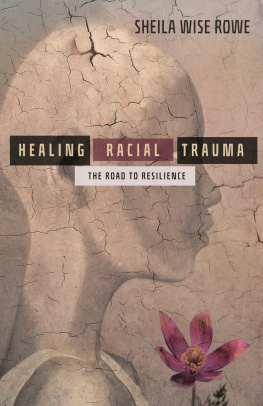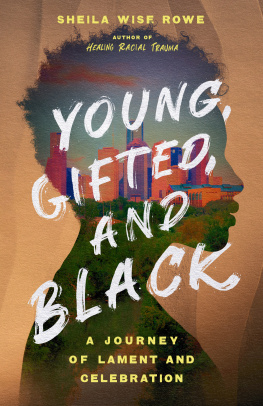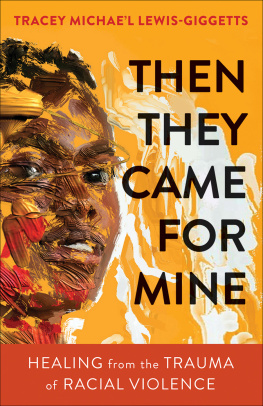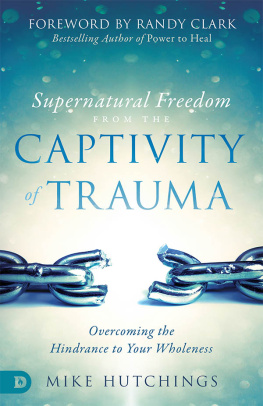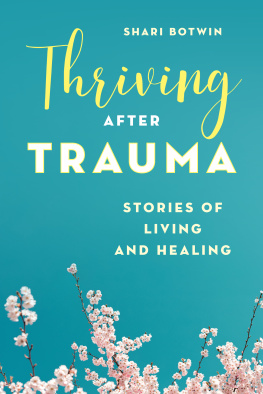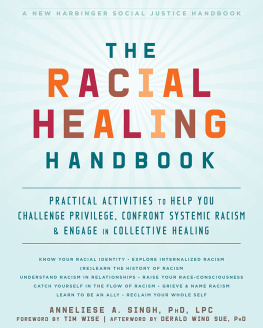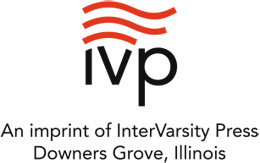Sommaire
Pagination de l'dition papier
Guide
HEALING
RACIAL
TRAUMA
THE ROAD TO RESILIENCE
SHEILA WISE ROWE
Foreword by Soong-Chan Rah
InterVarsity Press
P.O. Box 1400, Downers Grove, IL 60515-1426
ivpress.com
2020 by Sheila Wise Rowe
All rights reserved. No part of this book may be reproduced in any form without written permission from InterVarsity Press.
InterVarsity Press is the book-publishing division of InterVarsity Christian Fellowship/USA , a movement of students and faculty active on campus at hundreds of universities, colleges, and schools of nursing in the United States of America, and a member movement of the International Fellowship of Evangelical Students. For information about local and regional activities, visit intervarsity.org .
Scripture quotations, unless otherwise noted, are from the New Revised Standard Version of the Bible, copyright 1989 by the Division of Christian Education of the National Council of the Churches of Christ in the USA. Used by permission. All rights reserved.
While any stories in this book are true, some names and identifying information may have been
changed to protect the privacy of individuals.
Cover design and image composite: Christopher Tobias / Tobias Design, Inc.
Interior design: Daniel van Loon
Images: flower: Hanka Steidle / Arcangel Images
human profile with cracked surface: Sarah Jarrett / Arcangel Images
ISBN 978-0-8308-4387-9 (digital)
ISBN 978-0-8308-4588-0 (print)
This digital document has been produced by Nord Compo.
For my parents
Robert Wise, who gave me deep roots, and
Mae Wise, who gave me wings to fly.
FOREWORD
Soong-Chan Rah
N early two decades ago, before the topic of race and racial reconciliation became the latest fad for some believers, a small group of Christians in the Boston area gathered to envision what a conversation on race and emotional and spiritual healing could look like. It was a diverse group of pastors and leaders from three different churches representing multiple ethnic groups. The clear thought leaders of this group were my dear friends Sheila Wise Rowe and Nicholas Rowe. As we planned a conference to discuss the questions and issues around this conversation and the necessary spiritual warfare for a fruitful gathering, my admiration for this powerful ministry couple continued to grow. Over two decades of friendship, my respect for their ministry has not waned in the slightest as I have seen their integrity result in deep impact on both a local and global scale.
There was no fanfare, media coverage, or national attention on the conference we planned together. The number of participants would be considered paltry when compared to the conferences now held on this topic among evangelicals. What I remember about that gathering was the resounding spiritual impact it had on my own life. Even after many years of engaging the topic of racial reconciliation through multiple venues and contexts, key moments of that gathering still linger. I most distinctly remember Sheila Wise Rowe standing before the gathering and offering a prayer of healing from the trauma of racial wounds. Her words were endowed with grace and filled with spiritual authority. Sheila applied all of her training as a counselor, her strength as a black woman, and her standing as a spiritual leader to bring healing to the racial trauma so endemic to our society.
The violent trauma inflicted by the diseased and dysfunctional narrative of White supremacy has often gone unaddressed in our discourse on race. We must continue to do the work of historical and social analysis that provides insight into the trauma of racism. The generational impact of Americas original sin and the ongoing suffering inflicted through contemporary expressions such as mass incarceration, family separation at the border, and the rejection of refugees and asylum seekers must be examined. Theological work must also continue as we dig deeper into Scripture to discern Gods words on the subject. But we may need more.
Some of our most profound social illsand what is Making America Awful Againis an inability to deal with the social-psychological trauma of White supremacy. Our social analysis and theological inquiry could use a good dose of pastoral psychology in order for complete healing to occur. This healing is not merely for the victim. In some ways the victimizers have also been traumatized. They have been traumatized into believing that their way is the path to greatness rather than seeking first the kingdom of God.

